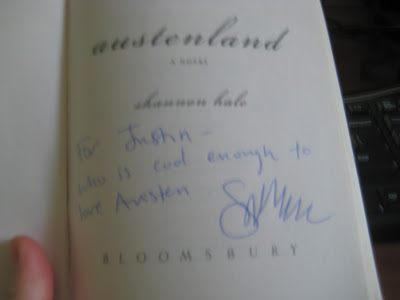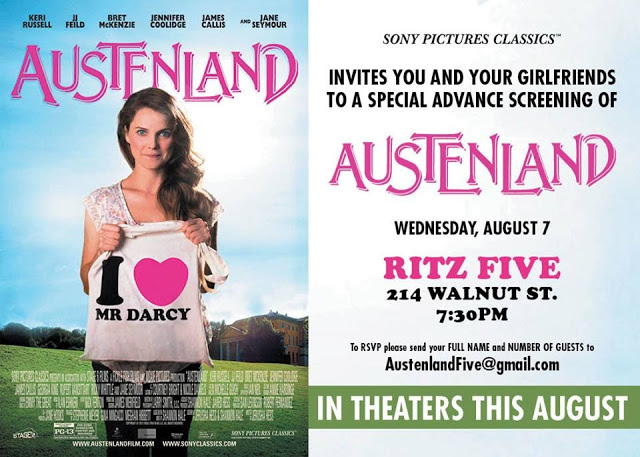For all those still reading this post on the old blog, I will keep these posts up for the next six or seven months before closing out the blog. I feel like I am extending the deadline of this old blog's existence ad infinitum, but there seems to be numerous followers of this older blog.
Link to New Blog: http://www.bibliophilesreverie.com/ |
 |
| Why are these male creatures besmirching my male-exclusionary Jane Austen fantasy? |
Tread Carefully: Snarkiness Abounds!!
As many of you may not be aware of, Shannon Hale's hilariously smart "chick-lit" novel,
Austenland, that rhapsodizes one woman's obsessive love with all things pertaining to Jane Austen is becoming a film. It is slated to be released August 15th, 2013. Everything about the marketing of the book has always screamed "
Excuse me sir, you might not want to emasculate yourself with this book that is ostensible chick-lit." Bravely, I read the book without writing abashed Facebook statuses that clarified that my masculinity was still preserved, after reading this book. I howled with laughter and loved every page of this clever, well-written book. The book pays homage to an author, who has supplied endless amounts of witty pleasure, since the beginning of the nineteenth century.
Acknowledging my bravery, I even attended a Shannon Hale book signing without any fear of gathering cooties (the modern colloquial phrase used to pejoratively describe "emasculation"). I remember telling her about how much I enjoyed the book, being someone that has always loved "Masterpiece Theater" productions of Jane Austen works. Even if the book featured a female protagonist and a romantic plot line, the humor and witticism would be appreciated by any reader of well-written fiction, regardless of gender.

Alas, Sony Classics felt the urge to implicitly inform me that no man would ever dare endeavor to see Austenland.
 |
| "Girlfriend, why would any gentlemen, including Mr. Darcy himself, want to attend this screening?" |
Thanks to the wonderful writers for the
Mary Sue for first enlightening me to this problem with Sony Classic's marketing of this entire thing. As evidenced by the banner advertising the upcoming Philly screening, they are essentially implicating that this movie is restrictively for females, in a sense. I've seen tons of ads for chick flicks before in the newspaper. One of my favorite of those films,
Easy A, relied on the film's evident cleverness and snarky attitude, rather than trying to propagate a gender exclusionary message.
Again, the Mary Sue highlighted this problem with the marketing, by summing up in much better words than I can even muster myself:
"The way that the media surrounding the situation sounds, they mean “women-the-completely-homogenous-group-who-will-all-like-the-same-thing-because-they-are-women.” This marketing assumes that ALL women want to watch period reenactments and romantic stories and pretty dresses, that there is no variation in taste. This also, by extension, assumes that all men who are “real men” won’t be interested in those same things because that’s not “what men like.” Well written Quote taken from Mary Sue article, written by Brooke Jaffe
As exemplified by this quote from a very informative article about the marketing problems for this film, this kind of marketing may have a very prudent focus. At the same time, it makes cultural assumptions that men are inherently uninterested in this type of flick. While I may not like Michael Bay action films, the advertising behind a high-octane action film never has this type of gender-stereotyped advertising that has this strange subtext that remarks that "Women are inherently not interested in dude films like
Transformers."
The Mary Sue also makes a good point that it also stereotypes women by saying that period reenactments are supposedly something ALL women enjoy. Based on what many of my female friends watch, they watch the same shows that I enjoy such as
Buffy:the Vampire Slayer, Firefly, and
Doctor Who. None of these shows have such superficial marketing campaigns that represent the entire work, as a whole, as being a supposed frilly, shallow film adaptation of a book that was really clever (and reminded me of something written by Jasper Fforde).
More importantly, history attests to the male interest in Jane Austen's stories.
One thing that our gender stereotyping society has never willfully acknowledged that there has been a spate of men throughout history that have made their admiration for Jane Austen an open secret. Let us read this post, by Rudyard Kipling, for example. Many people are not wholly aware that Rudyard Kipling, the sturdy male author that seemingly represented ostentatious machismo, was a diehard Jane Austen fanboy himself. Courtesy of the following webpage,
the Rudyard Kipling Society in England, the following quote essentially shows his undying fervor for the early nineteenth century writer:
| “the more I read the more I admire and respect and do reverence… When she looks straight at a man or a woman she is greater than those who were alive with her - by a whole head… with a more delicate hand and a keener scalpel.” (Rudyard Kiping, disclosing his diehard love of Jane Austen to a friend in not so strict confidence) |
During the same time period, the horrors of World War I were barraging the minds of English citizens. Soldiers were particularly stricken with a slew of debilitating psychological disorders, as a result of some of the unpleasant and stomach-turning scenes of violence that they were witness to on a daily basis in the war. Not knowing of Sony Classic's belief that Jane Austen was only privy to woman-folk, Jane Austen books were actually prescribed as an antidote/psychological curative of the highest witty potency to help these war-weary men overcome their deep-seated melancholy.
Thanks to this article from "The Telegraph," we have certifiable proof that Jane Austen not only helped women to escape the horrors that plagued reality sometimes.
“Jane Austen was prescribed to shell shock victims after the First World War as an antidote to mental trouble. She was read in the trenches. She was a prescribed script for tortured, troubled souls." (Quote Taken from "The Telegraph" article, entitled "Jane Austen Prescribed as antidote to the Horrors of WW1)
Why did Sony Classics feel the need to market the film in such an inept way? I guess that is something left up to the bloggers to speculate and ponder about. In the meantime, I still plan on seeing the film. Hell, I feel like being a revolutionary, and attending the screening dressed as Mr. Darcy himself. Now, that would a hilarious subtle protest against this terrible marketing campaign that only reinforces the sexist idea that chick flicks are not generally more superficial somehow than action films (geared for men, though not explicitly), but that the realm of feminized entertainment somehow too puzzling and emasculating for men to watch. Why is it hard for more creative marketing forces to not focus on the merits of the film, and allow the audience to grow organically without implicitly informing people that this film somehow is socially unacceptable for men to watch?














